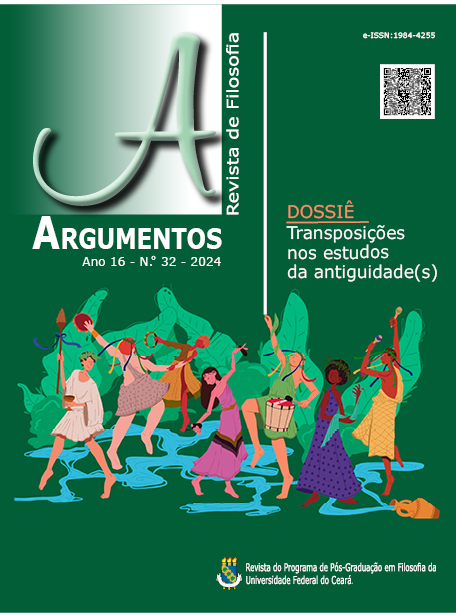O que é filosofia pública
DOI:
https://doi.org/10.36517/Argumentos.16.32.93114Palavras-chave:
Filosofia pública. Explicação. Filosofia das ciências. Intelectual público.Resumo
Neste artigo, proponho uma nova definição para filosofia pública. Apoiando-me em critérios oferecidos por Carnap para a explicação de um conceito, argumento que a nova definição oferecida é mais precisa, suficientemente semelhante ao uso vigente e mais filosófica e socialmente proveitosa que as definições existentes. Também apresento aqueles que considero ser os três tipos arquetípicos de filosofia pública, além de dois casos híbridos. Brevemente, defino a filosofia pública como a filosofia feita para o público externo à filosofia, com base nos interesses ou investigações desse público externo.
Downloads
Referências
ALEXANDROVA, A. Can the Science of Well-Being Be Objective? British Journal for the Philosophy of Science, v. 69, n. 2, 2018, p. 421–445.
BOTELHO, A.; SCHWARCZ, L. M. Esse enigma chamado Brasil: apresentação. In: BOTELHO, A.; SCHWARCZ, L. M. (Ed.). Um enigma chamado Brasil: 29 intérpretes e um país. São Paulo: Companhia das Letras, 2009. p. 7-10.
CARNAP, R. Logical foundations of probability. 2. ed. Chicago: The University of Chicago Press; Routledge & Kegan Paul, 1962.
CARNAP, R. Meaning and necessity: a study in semantics and modal logic. Chicago: The University of Chicago Press, 1947.
FEHR, C.; PLAISANCE, K. S. Socially relevant philosophy of science: an introduction. Synthese, v. 177, n. 3, 2010, p. 301–316.
GETTIER, E. L. Is Justified True Belief Knowledge? Analysis, v. 23, n. 6, jun./1963, p. 121-131.
LAPLANE, L. et. al. Why science needs philosophy. Proceedings of the National Academy of Sciences of the United States of America, v. 116, n. 10, 2016, p. 3948-3952.
MCINTYRE, L.; MCHUGH, N.; OLASOV, I. A companion to public philosophy. [S.l.] Wiley-Blackwell, 2022.
NAGEL, E. The structure of science: problems in the logic of scientific explanation. New York: Harcourt, Brace & World, 1961.
SANDEL, M. J. Public philosophy: essays on morality in politics. Cambridge; London: Harvard University Press, 2005.
SELLARS, W. Science, perception and reality. Atascadero: Ridgeview Publishing Company, 1991.
STRAWSON, P. F. Carnap’s views on constructed systems versus natural languages in analytic philosophy. In: SCHILPP, P. A. (Ed.). The philosophy of Rudolf Carnap. La Salle: Open Court, 1963. p. 503-518.
TULLY, J. Public philosophy in a new key. Volume 1: Democracy and civic freedom. Cambridge: Cambridge University Press, 2009.
WALZER, M. The political theory license. Annual Review of Political Science, v. 16, n. 1, 2013, p. 1–9.
WOLFF, F. Dilema dos Intelectuais. Disponível em: https://artepensamento.com.br/item/dilema-dos-intelectuais/.
Downloads
Publicado
Como Citar
Edição
Seção
Licença
Autores que publicam nesta revista concordam com os seguintes termos (SOBRE COPYRIGHT E POLÍTICA DE ACESSO LIVRE):
1. Autores mantém OS DIREITOS AUTORAIS concedidos à revista OU Direito de Primeira Publicação, com o trabalho simultaneamente licenciado à Atribuição de Licença Creative Commons (CC BY) que permite o compartilhamento dos trabalhos com reconhecimento de autoria e publicação inicial nesta revista.
2. Autores têm permissão para aceitar contratos, distribuição não-exclusiva da versão do trabalho publicada nesta revista (por exemplo: publicar no repositório institucional ou como um capítulo do livro), com reconhecimento de autoria e publicação inicial nesta revista.
3. Autores têm permissão e são estimulados a publicar e distribuir seu trabalho on-line (por exemplo: em repositórios institucionais ou em sua página pessoal) mesmo durante o processo editorial, haja visto que isso pode aumentar o impacto e citação do trabalho publicado.




.jpg)










._._3.png)
1.jpg)
._._._.png)
